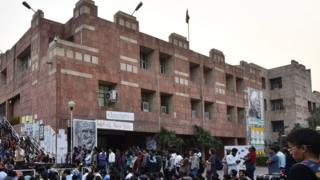Does JNU campus attack mean India is failing its young?
Its list of alumni includes a Nobel-Prize winning economist, former prime ministers of Libya and Nepal, and many leading politicians, diplomats, artists and academics. It is also an internationally renowned centre for teaching and research, and is among one of India’s top ranked universities.
Yet the storied reputation of Delhi’s Jawaharlal Nehru University (JNU) didn’t deter a mob of masked men armed with sticks, stones and iron rods running berserk on its sprawling campus on Sunday evening. They attacked students and teachers and destroyed property even as the police refused to intervene for more than an hour. Outside the campus gates, another mob shouted nationalist slogans and targeted journalists and ambulances. Nearly 40 people were hurt in the violence.
Left and right-wing students groups have blamed each other for the violence. Most eyewitnesses told reporters that the mob was mainly made up of men belonging to the ABVP – the right-wing students group linked to India’s governing Bharatiya Janata Party (BJP) – and a clutch of outsiders.
Ostensibly, Sunday’s violence appears to have been stoked by a dispute over a hostel fee hike, which has roiled the campus for the last few months. University authorities have blamed the attack on a “group of students” who were opposing an ongoing admission process to register new students – it is widely believed that the statement referred to leftist students who have been protesting against the fee hike.
But there are deepening fears that the BJP wants to muzzle dissent on the campus, which has traditionally been a hotbed of left-wing politics. Ever since Mr Modi’s party stormed to power riding a crest of Hindu nationalism, JNU has been a constant target. Students have been charged with sedition for making speeches, and the university has been vilified by the party and partisan news networks as “anti-national”. Its students have been called “urban” Maoists.
Sunday’s campus attack tells you a few things about India.
For one, it points to a breakdown of law and order in the capital, the responsibility of which lies with India’s powerful interior minister Amit Shah. If mobs can enter one of India’s best universities and the police fails to protect students and teachers, then who exactly is safe, many are asking.
Also, critics say BJP’s brand of politics is leading to expected – and disturbing – consequences.
Since he has been in office, Mr Modi and Mr Shah have relentlessly belittled and demonised political opponents and critics, calling them anti-national and and urban Maoists. “By calling all protests as anti-national, an atmosphere of legtimisation of lawless violence has been developed,” says political scientist Suhas Palshikar. There’s been, he adds, a “systematic manufacturing of atmosphere of suspicion and hatred”.
The result is that there is dwindling tolerance for dissenting views. The incident, according to Roshan Kishore, a senior journalist and JNU alumnus himself, proves that “we are living in an age where ideological differences in places of learning will be crushed by brute force, and the state at best will remain a bystander”.
The attack on JNU is tragic in more ways than one.
The university has an amazing diversity of students, cutting across class, caste, gender and religion. The campus is a “revolution of sorts” in intensely hierarchical India where the rich and poor, the influential and the obscure, the city-bred and students from villages meet, study and live, says Rakesh Batabyal, author of JNU: The Making Of A University. “What happened on Sunday night is something the campus has never seen,” adds Atul Sood, a faculty member.
However, the campus is no stranger to violent conflict. In the 1980s teachers and students clashed over plans to change the admission policy. Newspaper headlines spoke about the “anarchy” on the campus. Students attacked teacher’s homes on the campus. Police, according to many accounts, thrashed students. A number of students were arrested and nearly 40 of them expelled from the campus. Force, writes Mr Batabyal, became a “new signifier for politics in the campus”.
Things are different this time. The government’s response to the violence has been frosty: it has refused to engage with protesting students. The JNU incident is the third time since December that protesting students have been targeted in campuses – students of two leading universities in Delhi and the northern city of Aligarh have recently borne the brunt of police brutality. “The constant demonisation of students by the government continues to increase their vulnerability to such attacks and awards impunity to the attackers. It is imperative that the government listens to its citizens,” says Avinash Kumar of Amnesty International India.
What is more worrying, is that India’s opposition has failed to pick up the cudgels on behalf of the students. “A society which condones violence against its universities is only condoning the destruction of its future,” says Mr Kishore. India is clearly failing its young.
Read more from Soutik Biswas
Follow Soutik on Twitter at @soutikBBC
Source: Read Full Article



